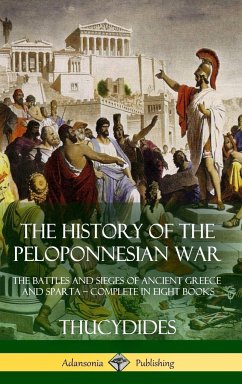This edition of Thucylides epic chronicle, The History of the Peloponnesian War, contains all eight books in the authoritative English translation of Richard Crawley. Thucylides himself was an Athenian general who personally witnessed the various skirmishes of the war. Ordering all of the events chronologically - a first for any work of history - he offers a straightforward account of the conflict, straying little to personal opinions or permitting his history to be influenced by the politics of the era. For this, Thucylides' is lauded for his methodical telling of each battle, which offers the reader insight into Greek and Spartan tactics and cultures. Throughout the history, we are given transcripts of various speeches. Although the inclusion of such lengthy quotations of sources is unheard of in modern history books, the presence of lengthy oratory in Thucylides' history is considered to be a cultural trait: speech and rhetoric were prized in Greece as the prime means of transferring knowledge.
Bitte wählen Sie Ihr Anliegen aus.
Rechnungen
Retourenschein anfordern
Bestellstatus
Storno








